- Home
- Helen Dunmore
Betrayal Page 3
Betrayal Read online
Page 3
‘Irina …’ Anna wants to say, ‘Be careful …’ but of course you can’t say such a thing.
Irina winks. ‘I am getting support at the highest level for the cross-generational, outreach and home-penetrational aspects of the campaign.’
‘It sounds a lot of work. You picked the wrong special interest.’
‘I picked it? But don’t worry, I have a new one in mind.’
‘What can it be?’
Irina flicks Anna a look from under her lashes. ‘I am making a full-time, one-hundred-per-cent-committed study of available men within the twenty-five-to-forty-five-year age group.’
‘And reporting back, I hope?’
‘If it seems “appropriate”,’ says Irina, with a sanctimonious smile and perfect mimicry of another pet word of Larissa Nikolayevna’s.
‘You’re not fair to her. She’s transformed this place,’ says Anna. ‘You’ve got to admit she’s the best we’ve ever had.’
‘I know. I know,’ says Irina, suddenly sounding so weary that Anna looks at her in surprise. ‘It’s all right for Morozova, though, isn’t it? A husband, three children – I ask you, whoever has three children these days? – a good job, and she’ll get a better one, she’s on the move all right, that one. And she’s only thirty-seven. It’s not even as if she’s ugly. Have you seen her husband?’
‘Mmm, yes, I did once.’
‘Mmm, yes, exactly. What I want to know is, how did she get hold of him? There aren’t any men like that around any more. And you know what, Anna, he takes her dancing on Saturday nights.’
‘She moves well, even though she’s tiny,’ says Anna thoughtfully. ‘She’d be a good dancer.’
‘The whole thing makes me sick,’ says Irina. ‘Do you know what I’m doing on my Saturday night?’
‘No, what?’
‘Going to the flicks with my sister. She’ll chomp her way through a whole bag of sunflower seeds, and cry at the soppy bits.’
‘Don’t, Irinochka. You’ve got loads of time, you’re only twenty-eight. Look at your hair. I wish mine was as lovely and thick as yours. And you’ve got beautiful eyes.’
‘It’s not enough, though, is it, not when there are ten women to one decent man. You’ve done all right, Anna, you’ve got Andrei. You were lucky. Go on, tell me what you’ll be doing on Saturday night. Rub salt in the wound.’
Anna laughs. ‘Andrei’s taking Kolya on a fishing trip, so they’ll be away overnight. I’m going to work on my dress.’
‘Oh – you mean the dress? Has he found out about it yet?’
‘No, and he’s not going to until the evening of the ball.’
‘You see, there you are. A perfect place for me to research my special subject, but it’ll be you going. What a waste.’
‘I think you’ve got the wrong idea of what a hospital ball is like,’ says Anna, thinking of the crowded floor, the women doctors with their hair tightly curled and their ill-fitting, hopeful dresses, the men outnumbered and drinking too much.
‘The thing is,’ says Irina with a sudden passion that catches Anna off guard, ‘I wish it was a joke, but it’s not. I’m so sick of it all. The way things are. Never anything happening except what you know is going to happen. Is this how it’s meant to be?’
Anna glances at the door. But it’s all right, Irina isn’t really talking loudly. Like everyone else, she’s so much in the habit of being careful that she never really loses control. ‘I don’t know how things are meant to be,’ she says quietly, and there is a short silence. Then, ‘Listen, when the ball is over, why don’t you borrow the dress one evening? We’re about the same size, and the colour would be lovely on you. You could go dancing.’
Irina has seen the fabric. Anna brought it in, a beautiful soft dark green glazed cotton. You couldn’t buy such quality nowadays. It was something from long ago, which came out of a small travelling trunk that a theatre friend of Marina’s had brought from Moscow, years after the war. He had kept it safe. The trunk was valuable in itself, because it was covered in fine leather and had a lock that still clicked open as smoothly as the day it was made. It contained two parcels of material and a pair of red satin slippers that were too small for Anna. Marina’s slippers. Anna weighed them in her hand, thinking of the dead woman, her father’s friend. Her father’s lover, who had loved him all her life, and now lay with him in the same communal grave.
There was a dress-length of red silk in one of the parcels, but the colour was too striking. It would make her stand out. To arouse envy was dangerous. Silk, after all …
The silk fetched a good price, and Anna put the money towards Kolya’s school clothes, and new winter boots. She kept the slippers. They seemed too personal to sell; they had the faintest imprint of Marina’s feet in them. She thought of Marina walking around their apartment with her quick, light steps and her beautiful actress’s carriage. But she’d proved how tough she was. Marina had fought for life and she’d kept them all fighting. It wasn’t until Anna’s father died that she gave up.
Anna closed her eyes, holding the slippers. She saw her father, wrapped in frost, and Marina clinging to his body.
They were gone. How crazy it seemed, that a fragile luxury like these slippers should survive when Marina and her father were dead. She folded them back in the tissue paper, and replaced them in the chest.
But she would use the green cotton.
‘Really? You’re sure you wouldn’t mind lending it?’ Irina was asking eagerly.
‘Quite sure. Besides, we all have a duty to share the fruits of our special-interest research with one another.’ She smiles, but Irina doesn’t smile back. She’s looking over Anna’s shoulder.
Anna hasn’t heard the light footsteps. The first she knows of Larissa Nikolayevna’s presence is her crisply approving, ‘My own view exactly, Anna Mikhailovna.’
A wave of heat rushes through Anna’s body, but long habit supports her. ‘We were discussing the children’s measurements, Larissa Nikolayevna.’
‘You’ve established your subset?’
‘I think so.’
‘Excellent. I look forward to hearing your outcomes. But surely you should be going, both of you?’
‘I’m just going to do a little more on the averages,’ murmurs Anna, pushing back her hair and stifling the faint unease she always feels when talking to a woman who is so much shorter than she is, and so much higher up. Morozova is finished and perfect in her tailored cream blouse and a dark skirt and jacket which look as if they’ve been made to some special, miniature pattern. They are office clothes. They tell the world that while the nursery has to be a place of overalls, mopped floors and the smell of children sleeping in the early afternoons, it is also a proper, scientifically managed workplace with targets to meet and an impressive reputation in the wider pedagogical world. Anna looks measuringly at the waist and lapels of the dark suit.
Morozova nods once more, and then gives them both her sudden, vivid smile. That smile never fails to weaken Anna. Just when she thinks she has got the measure of Morozova and her ambitions, that smile says something quite different. There is a captivating warmth behind its brilliance. In spite of herself, Anna finds herself wanting to please, to fulfil, to present her statistics immaculately and slightly ahead of the target time.
‘Excellent,’ Morozova repeats. ‘Well, I’m in my office if you have any difficulties.’
As if that needs to be said. She won’t leave before eight. There’s an inspection coming up, and then a Professor of Child Development is bringing students here on Friday as part of their fieldwork. The nursery is becoming known as a first-rate site for research. As the inspection approaches, everyone works later and later. Better to be bog-eyed than caught out. There must be no sign of slackness. One set of poorly kept records might be enough to wreck the collective effort. Morozova doesn’t need to point this out. The pressure is within each one of them, and there will be no letting up.
A few weeks earlier, Anna was called into Moro
zova’s office ‘for a chat’. ‘I’ve been observing your work, Anna Mikhailovna. I am happy to tell you that you’re doing very well. But you know that already, and I want to talk to you about something else. It still seems to me that you are not reaching your potential. Your organizational skills are excellent. You have a strong grasp of statistics, even though I understand that you have no qualifications in the field. In fact, I would go so far as to say that you have a mathematical brain.’ Morozova looked expectant. This was high praise and she would want Anna to acknowledge it as such. Anna bowed her head, feeling awkward. ‘Your relationships with other staff are very good,’ Morozova continued, ‘and so, all in all, in my opinion, you have unused capacity. Obviously you need training; you will have to attend further courses. Ideally you require a pedagogical qualification, but I understand that full-time study for a degree may not be feasible?’ She paused. The word ‘degree’ resonated in the silence.
‘No,’ said Anna. Better say too little than too much. Certainly better than allowing anyone to guess the real reason she would never apply for a university course.
It was the forms. They asked for too much information. Those lethal questions about family and background would reveal her class origins and allow an experienced reader to trace her father’s long years out of favour, unpublished and suspect. Kolya must never be tainted. He would need to apply to university one day, but she wasn’t going to think of that yet. He was only sixteen. Things might have changed by then. Meanwhile, the stupidest thing you could do, if there happened to be any blot on your copybook, was to remind the high-ups that you existed at all.
‘In that case,’ went on Morozova briskly, ‘let’s focus on what can be achieved by further part-time study. Courses in mathematics and statistics would be particularly appropriate for the development of your career. I shall most certainly support your application, Anna Mikhailovna.’
‘It’s very good of you –’
‘You can achieve valuable qualifications. You need to be thinking about promotion prospects.’
Anna’s mind raced. She must be very careful. ‘I’m very grateful,’ she said.
The other woman looked at her sharply. ‘But? Do I hear a “but” coming?’
‘It’s – well, it’s difficult for me. Andrei works long hours at the hospital. Kolya’s studying hard and it’s important for me to be there in the evenings.’
Morozova poked her head forward, like a blackbird considering a worm. ‘Surely it’s possible to organize your domestic life so that your career isn’t held back.’
Anna bit back a reply. She thought of lunch hours spent rushing from queue to queue, of peeling the potatoes for supper before taking off her coat, of nights when Kolya coughed and coughed and she knew that next morning bronchitis would have set in. Of endless negotiations over the cleaning of the common ways, and the fact that she usually ended up sweeping and scrubbing the stairs herself, because she can’t bear how dirty they get.
But Morozova has three children, and she has never been known to take a day off. One adolescent boy is no argument. Morozova is a graduate of the Herzen Pedagogical Institute. She possesses a masters in pre-school education. In time she will complete the research and write up her doctoral thesis: ‘A Consideration of Primary Aspects of Goal-identification in Target-setting for Language Skills in the Under-sevens’. She’d be bound to think that if Anna defined her goals she’d be able to sail past dirty floors.
‘I like working here, with the children,’ said Anna.
But Morozova wasn’t going to let that pass, either. ‘Look at it another way, Anna Mikhailovna. A worker who consistently underperforms – that is, fails to fulfil her potential – might, in a sense, be seen as stealing.’
‘ “Stealing”!’
‘Yes. Such a person might be seen as depriving society of what it has a right to expect: that is, the fullest possible engagement.’
Anna was silenced. To say nothing was risky, but not as risky as saying the wrong thing at such a moment. But suddenly Morozova relented, allowing a kindlier smile to settle on her lips.
‘Of course I am not saying that you are such a person. Gracious me, this is just a private chat between the two of us. As I’ve said to you before, you are doing well. But think about it, Anna Mikhailovna. Let me share something a little more personal with you. It has always been my policy never – never – to fail in seizing an opportunity. And it’s because I’ve been watching you – and because of my respect for your work – that I want to be sure that you take the opportunities that are offered to you.’
Anna hasn’t mentioned this conversation to Andrei. Partly it’s because she’s still not quite sure of her own position. Has Morozova spotted something real, which Anna ought to address?
Morozova is from Moscow. She didn’t live through the siege. Hard as life probably was for her – and Anna knows that she lost a brother – she has a kind of energy, even an innocence, which Anna no longer possesses.
All she wanted, as those terrible months stretched out as if they would never end, was to live, to be on this earth, to put food into Kolya’s mouth, to sit in the radiating heat of a lit stove. All these things seemed as remote as miracles.
She had survived. She’d lived so much with the dead that she had felt like one of them. Their hands had reached out for her, and she’d almost clasped them. Her father had lain frozen in the next room, long day after long day, waiting for Anna to come to him. Marina had died, too. The streets had been full of people waiting curled up under snowdrifts with one blackened hand clutching at the air, or seated in trams that were frozen to the tracks, as powder snow blew in and filled the caves of their eyes. In the city’s parks they sat on benches, slumped like people tired after long days at work, fallen asleep while they waited for a summer that would never warm them.
It had finished. Green had broken over the city like a tide. But sometimes Anna still sees them, out of the corner of her eye. The grass has grown thick over their communal graves, but they are still waiting. When she struggles home through a February blizzard she seems to see them, leaning heavily on sticks, stopping every five paces to catch their breath, making their way to the bread queue.
But she has survived. She has left them behind, walking with the quick pace of someone who now eats three meals a day. Sometimes Anna feels a clench in her stomach, almost like fear, as if she’s lost something she’ll never be able to find again. She’s never mentioned this to anyone, but she thinks other people must share that feeling. It’s better not to talk about the things that really frighten you.
Andrei’s different. He talks about Mikhail and Marina quite naturally, as if they died in the ordinary way, and are safe in the past. When Kolya was little, Andrei would tell him the story of how he first met ‘your father’. ‘We were both in the People’s Volunteers, and we used to sit round the fire and talk. Once a woman gave us eggs and we cooked and shared them.’
‘And after that my father was wounded,’ Kolya would say, knowing the story, wanting to hear it again.
Kolya would be all right at school, with such stories to tell. He had a father who had fought and been wounded and then had died of his wounds, like so many fathers. The dark years before the war – the years of the Terror – could be covered up by this acceptable death. Little Kolya didn’t know about the friends who disappeared, or the fellow writers who sat on editorial boards and told Mikhail that really, no one wanted his kind of stuff these days.
‘And when Father was wounded, that’s how you met Anna,’ Kolya would say triumphantly, when he was seven or eight and believed in a past that fitted together as neatly as a jigsaw puzzle. His father had died, but Andrei had met Anna and now he lived with them. Most people who didn’t really know the family thought they were his parents. People would look surprised when he called them ‘Anna’ or ‘Andrei’.
But now he’s sixteen and the old stories don’t satisfy him. Talk of the past bores him. Even when his friends aren’t round, he still
spends hours in his room, choosing to be alone rather than with either of them. What he does in there, she has no idea. Kolya takes the luxury of a private space for granted, because he’s always had it. Sometimes she wants to shake him and shout: ‘Don’t you know how privileged you are? Don’t you realize how other people have to live?’
But of course he knows. He visits his friends. A boy like Kolya is aware of everything. It’s just – well, just that he doesn’t want to seem aware. At sixteen, you don’t want to be grateful.
She knows that Andrei wants a child. Andrei is like a father to Kolya, thinks Anna loyally, but it’s natural for a man to want a child of his own.
Is he really like a father, or is Anna just parroting what other people say about their little family? Does Kolya think that Andrei is a father to him?
It’s impossible to know what kind of father Mikhail might have been to a moody, strong-willed teenage boy. She’s slipped into the habit of thinking about her own father as if he were Kolya’s grandfather.
Kolya has changed so much in the past couple of years. He never confides in Anna these days. He seems wary, defensive, sometimes even ironic. He says he wants the right to drink beer, but he longs for sweet things like a baby. In fact, he’s greedy. You can’t leave a loaf of bread out on the table.
Anna thought that all adolescents devoured poetry; but not Kolya. He hardly opens a book and seems to regard Anna and Andrei’s reading as a foible he’s willing to put up with for the sake of peace. ‘All these books everywhere! Can’t we get rid of some of them?’ Once he came in from school and wrinkled his nose critically before pronouncing, ‘Do you know what this place smells of? Mouldy books!’ What her father would have said to this, she can’t begin to imagine.
At school most of the teachers tell the same story. Kolya gets by, causes no trouble, is an easygoing, well-liked student. His marks keep him safely in the middle of the class. They’re reasonably satisfied with his progress.
Only the occasional teacher has mentioned that Kolya is not really fulfilling his potential. Immediately her whole being sprang to Kolya’s defence. Or was it to her own? Was she really afraid that there was something in the life they led that had quenched Kolya’s ambition? You’ve made him like yourself, said a small, cold voice deep inside her. But no, that isn’t true. Kolya is entirely different.

 The Ingo Chronicles: Stormswept
The Ingo Chronicles: Stormswept The Deep
The Deep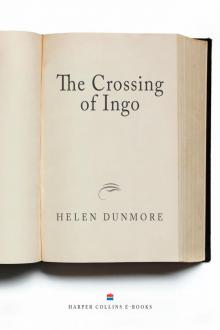 The Crossing of Ingo
The Crossing of Ingo Birdcage Walk
Birdcage Walk Glad of These Times
Glad of These Times Counting the Stars
Counting the Stars With Your Crooked Heart
With Your Crooked Heart Burning Bright
Burning Bright House of Orphans
House of Orphans Mourning Ruby
Mourning Ruby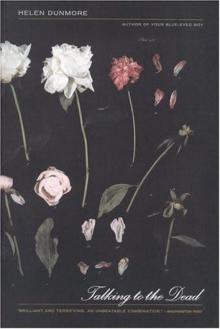 Talking to the Dead
Talking to the Dead Exposure
Exposure Ingo
Ingo The Malarkey
The Malarkey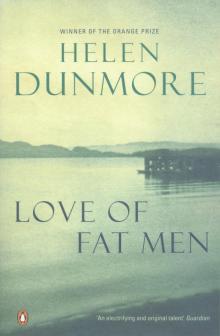 Love of Fat Men
Love of Fat Men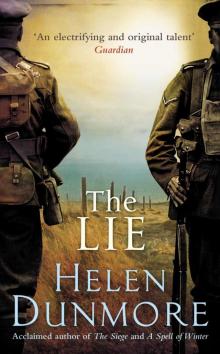 The Lie
The Lie The Siege
The Siege Inside the Wave
Inside the Wave Counting Backwards
Counting Backwards The Land Lubbers Lying Down Below (Penguin Specials)
The Land Lubbers Lying Down Below (Penguin Specials)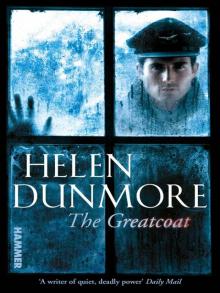 The Greatcoat
The Greatcoat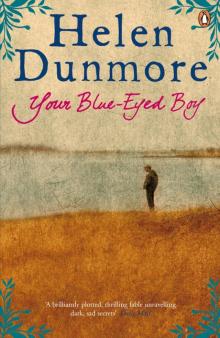 Your Blue Eyed Boy
Your Blue Eyed Boy Zennor in Darkness
Zennor in Darkness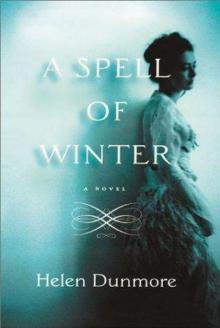 Spell of Winter
Spell of Winter Out of the Blue: Poems 1975-2001
Out of the Blue: Poems 1975-2001 Tide Knot
Tide Knot The Betrayal
The Betrayal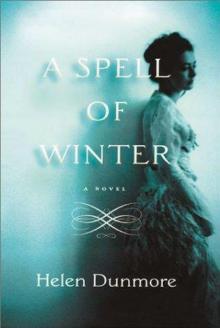 A Spell of Winter
A Spell of Winter Out of the Blue
Out of the Blue The Tide Knot
The Tide Knot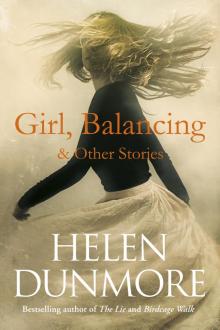 Girl, Balancing & Other Stories
Girl, Balancing & Other Stories Betrayal
Betrayal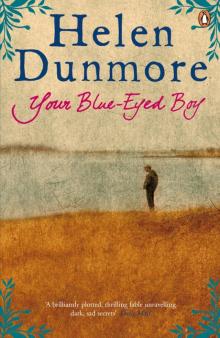 Your Blue-Eyed Boy
Your Blue-Eyed Boy